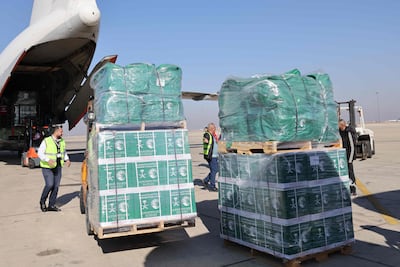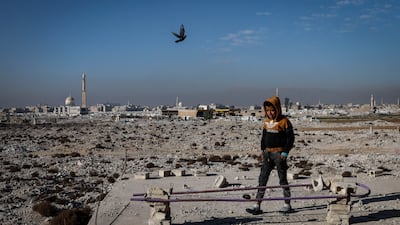US President Joe Biden's administration on Monday eased some of the country's sanctions on Syria to allow for quicker delivery of humanitarian aid for the new government in Damascus after the removal of former president Bashar Al Assad's regime.
For an initial six months, the move will allow the Treasury Department to issue waivers to aid groups and companies providing essentials including water, electricity and other humanitarian supplies.
“This action underscores the United States’ commitment to ensuring that US sanctions do not impede activities to meet basic human needs, including the provision of public services or humanitarian assistance,” the Treasury said in a statement.
There have been several meetings between US officials and members of Syria's interim government, led by former Al Qaeda affiliate Hayat Tahrir Al Sham, which led a rebel offensive last month that caused the collapse of the Assad regime.
The easing of some sanctions is a historic step for the US, which designated HTS as a terrorist group in 2014. The US has indicated repeatedly that it is willing to work with HTS, which has renounced its ties with Al Qaeda, if it can prove it has moderated its views.
Washington wants HTS, which has its origins in the extremist Al Nusra Front, to co-operate on priorities such as counter-terrorism and forming a government inclusive of all Syrians.
“The end of Bashar Al Assad’s brutal and repressive rule, backed by Russia and Iran, provides a unique opportunity for Syria and its people to rebuild,” deputy secretary of the Treasury Wally Adeyemo said.
Joe Wilson, Republican chairman of the Middle East subcommittee in the House of Representatives, told The National he believes such measures “will accelerate” when president-elect Donald Trump takes office on January 20.
“I want to give credit to the Biden administration, as they began this week an effort to reach out to the new government and to relax the different sanctions that are in place,” Mr Wilson said.
The toughest sanctions against Syria are not being removed, Bloomberg reported, but other countries will have more space to interact with Syria’s interim government in meeting the basic needs of the country’s people.
The International Committee of the Red Cross plans to expand its work in Syria significantly beyond an initial $100 million programme, the organisation's president said on Monday, with pressing needs in the health, water and power sectors.
Syria requires $4.07 billion in aid this year, but only 33.1 per cent has been funded, leaving a $2.73 billion gap, according to the UN Office for the Co-ordination of Humanitarian Affairs.
“Our programme originally for this year for Syria was $100 million, but we are likely to expand that significantly,” ICRC president Mirjana Spoljaric told Reuters. She said individual donor countries had come forward with an increase in funding for Syria.
The ICRC was one of the few international organisations still operating in Syria under Mr Al Assad's rule, working on infrastructure projects including water and electricity systems. “We need to expand that work. We have a lot to do in the health sector,” she added.
Lifting restrictions on aid to Syria is the least the Biden administration can do for the country's fledgling government, said Natasha Hall, a senior fellow in the Middle East Programme at the Centre for Strategic and International studies.
“The problem is that there's very, very little aid going into Syria, and it's mostly humanitarian aid,” Ms Hall told The National. She said it would probably be up to the Trump administration to make the necessary changes that would allow it to better support the country after more than a decade of civil war.
Other nations have moved to strengthen economic ties with Syria in the weeks since Mr Al Assad fled to Moscow.
Turkey said it wanted to help increase oil and natural gas production in Syria. Ankara is also working on ways to meet Syria’s electricity needs after more than a decade of conflict damaged the country’s infrastructure, said Alparslan Bayraktar, the Turkish Energy and Natural Resources Minister.
















